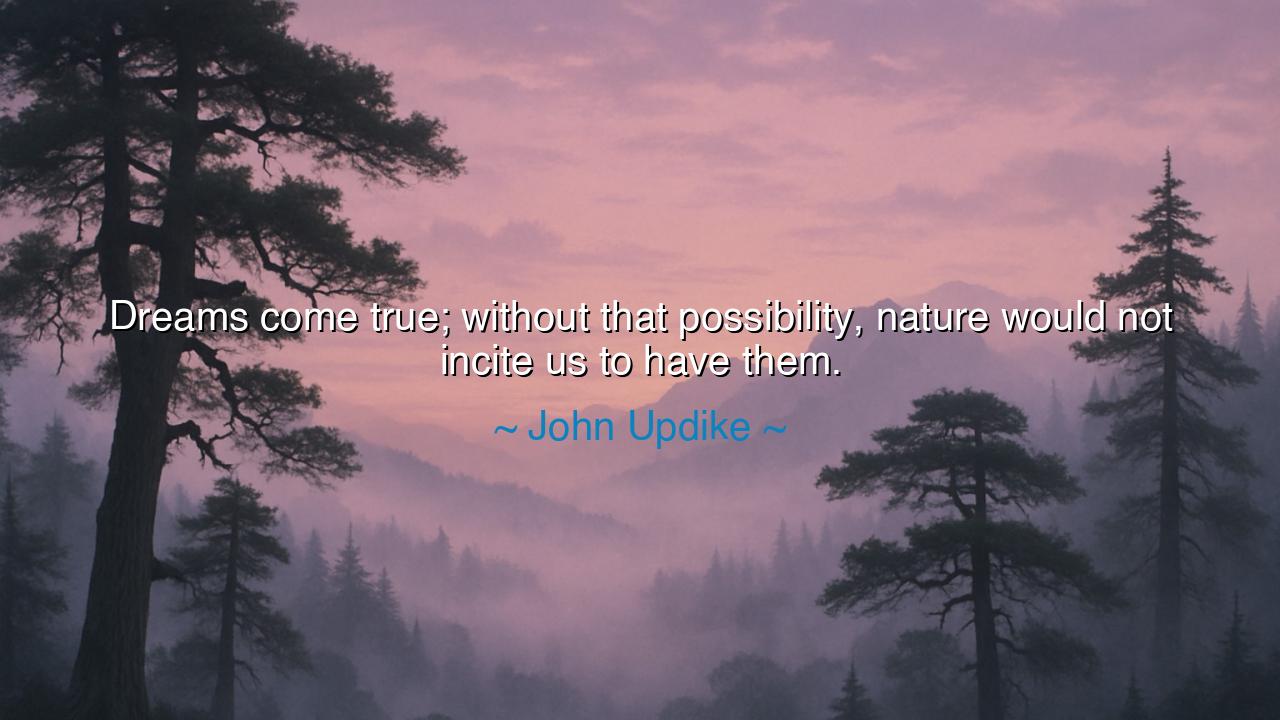
Dreams come true; without that possibility, nature would not






In the profound words of John Updike, "Dreams come true; without that possibility, nature would not incite us to have them," we are invited to reflect on the very essence of hope and human aspiration. Updike’s quote speaks to the belief that dreams, those intangible visions of a better future, are not mere fantasies, but rather invitations from nature itself, urging us to strive toward something greater. The dreams we hold, whether small or grand, are not simply random creations of the mind—they are the seeds of potential, planted by the very forces of life that push us to grow and evolve. If dreams had no possibility of realization, the human spirit would not be motivated to chase them. Updike reminds us that our aspirations are rooted in something deeper than ourselves, a universal force that seeks to bring those dreams into being.
The ancient world was filled with tales of heroes whose journeys were driven by their dreams of glory, truth, or discovery. Homer’s Iliad and Odyssey, for example, are the epic poems of Achilles and Odysseus, two figures whose desires for glory and homecoming led them to legendary achievements. The gods themselves, in these stories, often incited the heroes' dreams, pushing them toward their fates. Achilles, though faced with the certainty of his short life, pursued glory through his dreams of immortality and honor. The belief in the possibility of dreams coming true was what drove these ancient warriors to greatness, despite the monumental challenges they faced. In this way, Updike’s idea that dreams exist because nature instills the possibility of their fulfillment can be seen as an echo of these ancient stories—where the dream itself becomes a force that shapes the course of one’s life.
Consider the life of Leonardo da Vinci, whose dreams were not bound by the limitations of his time. Da Vinci’s desire to understand the world—from the flight of birds to the workings of the human body—was not simply a curiosity; it was a vision of possibility that led him to create inventions and art that were centuries ahead of their time. His dreams of what could be were fulfilled not because they were easy, but because the possibility of realizing them existed. Da Vinci’s life is a testament to the idea that dreams are not mere wishes, but forces that propel us to action, to challenge what is possible and to reshape the world in ways that reflect the visions of a better future. Through nature’s incitement, Leonardo was able to transform his dreams into lasting legacies that continue to inspire generations.
Dreams, as Updike suggests, are not just individual phenomena, but are deeply tied to the human condition—they reflect our inherent desire for growth, for transcendence, and for something greater than the confines of the present. The philosophers of ancient Greece, particularly Plato, understood that the dreams we chase often represent our search for higher truths. In his famous allegory of the cave, Plato described how prisoners, chained in a dark cave, could only see shadows of reality. It was only when they broke free from their chains and ventured into the light that they saw the world as it truly is. For Plato, the dreams of freedom and understanding were the very forces that motivated humanity to seek enlightenment. Our aspirations—much like the journey of those prisoners—are meant to pull us out of ignorance and into a deeper truth, where our dreams can become realities.
The idea that dreams come true also aligns with the real-life stories of those who, against all odds, achieved the impossible. Nelson Mandela dreamed of a South Africa free from apartheid, and although his journey was long and fraught with obstacles, his dreams of justice and equality were eventually realized. Mandela’s dreams were not mere fantasies; they were driven by a vision of a better world, and the possibility of that vision being fulfilled was what kept him going through years of imprisonment and hardship. His story is one of perseverance—a vivid example of how the dreams we hold can shape the future, not just for ourselves, but for generations to come.
In our own lives, Updike’s words remind us that dreams are not idle thoughts, but powerful forces that compel us to act. They are the visions of what is possible, even when the world around us tells us it is not. To dream is to believe in the possibility of a different future, and to act on that belief, as those who came before us did. Human progress, whether in the realms of science, art, or social justice, is a product of those who dared to dream and to chase those dreams, knowing that nature itself has set us on a path of endless possibility.
As we move through our own lives, let us embrace dreams not as fleeting desires, but as forces that can shape our destinies. Let us recognize that the possibility of achieving our dreams is the very spark that propels us forward, just as it has for countless individuals throughout history. The dreams we hold—whether grand or simple—are not mere fantasies, but part of the great tapestry of human potential, and by believing in them, we give ourselves the power to make them real. In this way, we honor the wisdom of those who have come before us, and we lay the foundation for the dreams of those who will follow.






AAdministratorAdministrator
Welcome, honored guests. Please leave a comment, we will respond soon